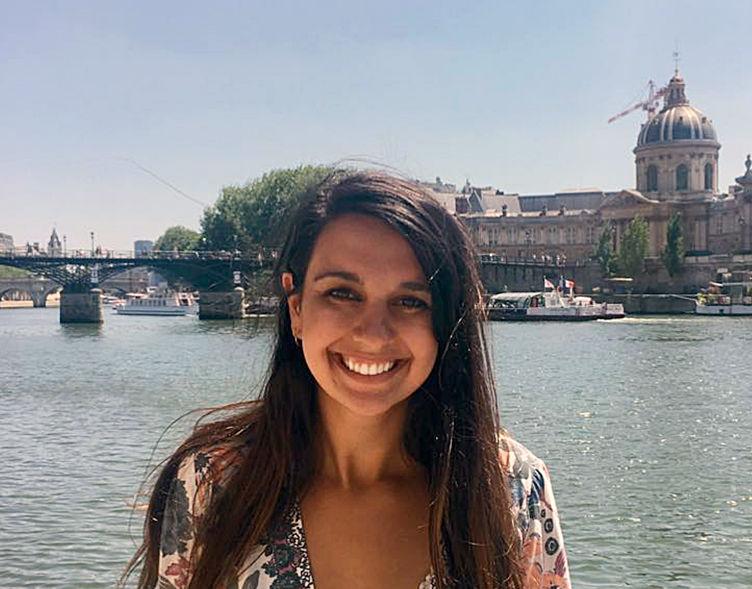Supriya Caton has dedicated her life to empowering others. Her unmistakable warmth radiates through a bubbly smile and the passionate way she talks about a topic that is typically hushed – mental illness. Sporting a vintage Sublime T-shirt and ripped jeans with dark, shiny locks flowing over her shoulders Caton, a third-year studying human biology, immediately exudes both individuality and confidence. When looking at 20-year-old Caton, one wouldn’t guess that she, like many young adults, has generalized anxiety disorder. But underneath her smile lies an inspirational story she so generously shares with others in hope of uniting and uplifting those who, in whatever capacity, have been affected by mental illness.
Coming from a tight-knit, half-Indian family, mental illness was not something Caton felt comfortable talking about while growing up. Even though there lies history of mental illness in Caton’s family, it didn’t make for appropriate dinner conversation in her suburban home located in Fuquay-Varina, North Carolina. Looking back, Caton realizes she has experienced anxiety symptoms from a young age, often “worrying about things little girls shouldn’t be worrying about.” It wasn’t until she was 16 years old, however, that she received a diagnosis. During high school Caton regularly saw a psychiatrist for self-harm; But it was on a seemingly average day, as a junior in high school, that everything changed.
“I had, the best way I can describe it, is a panic attack,” Caton said. “I started taking Advil and in the middle of it and I called 911.”
After three police cars pulled into the cul-de-sac outside of Caton’s childhood home, she was handcuffed and restrained as neighbors watched with wide eyes. This wasn’t a typical occurrence in such a quiet, white-picket-fence neighborhood. As her mom was out of town, and her dad at work at the time of the incident, Caton was forced into an impersonal system that too many have fallen into.
Involuntarily committed to Holly Hill Hospital Children’s Campus, a psychiatric hospital located here in Wake County, Caton was forced to stay for at least 72 hours. For Canton, the experience was disappointing as it lacked the supportive, recovery-centric element she was hoping for.
“A psychiatrist has to evaluate you before you leave,” Caton said. “He told me to ‘count my blessings’ because my life was a lot better than some of the other kids in there.’”
Caton took his advice to heart. It didn’t work. Panic attacks and depressive episodes persisted, but she remained dedicated to a smooth recovery by investing in the vast benefits of talk therapy. One of the many tools in her recovery toolbox – which also consisted of medication, breathing techniques, exercise and utilizing a support system – talk therapy was pivotal for Caton.
Between finding the right counselor and learning to open up wounds that are not completely healed, talk therapy still remains an intimidating process for most. In the end, however, it is worth the fight. Caton urged that mental health is, and should always remain, a priority for people of all ages and backgrounds. And, as being a college student brings about stressors all on its own, seeking help is something that can benefit even those who are not experiencing symptoms of a mental illness.
Now, a bright-eyed Caton regularly speaks in front of psychology classes at her alma mater, Fuquay-Varina High School, and at mental health awareness events here at NC State in order to stop the stigma related to mental health that has so adamantly persisted within today’s society. Perhaps what makes Caton such an impactful advocate is her immediate warmth, which fills a room with hope, safety and the feeling that someone else “gets it.”
Jacki Agusta, a fourth-year studying social work, first met Caton in a Spanish class. In between lectures, Agusta encouraged Caton to get involved with NC State’s Mental Health Ambassador (MHA) program, which Agusta had been involved with since its start. The two have been working together to help combat mental health-related issues ever since.
“It’s helpful that she’s been through the things she’s been through, and that she can relate to students going through the same thing,” Agusta said. “But even outside of that, the kind of person she is [is impactful]. Her story makes it more impactful, but she’s obviously so much more than that.”
As a MHA, Caton is dedicated to smashing the stigma related to mental illness, and empowering others by sharing her story.
“I’ve found out of so many people who’ve gone through similar things, and by me sharing, they can think ‘okay, I’m not alone in this. I can do this,”’ Caton said.
To make an appointment at the Counseling Center, call (919) 515-2423.













